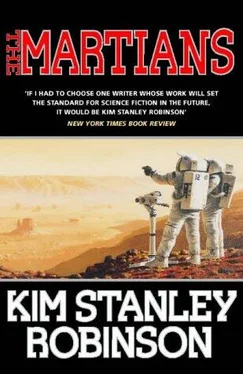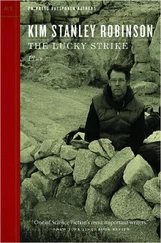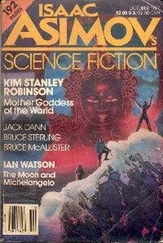Then things changed, as they will, and the kids went off to school, people moved; the whole feeling changed. It always happens that way. Now of course it’s still a beautiful place to live, but the feeling from those years is hard to recapture, especially given the cold, and the kids gone. I now think that kibbutz is a name for a certain time, a time in the life of a settlement, early on, when it is as much an adventure as it is a home. Later you have to reconceptualize it as a different kind of experience, as home ground or something, the whole shape of a life. But I remember the first time we had a big party and invited the neighbors, and fed everybody with only the food we had been able to grow there in our new gardens, there in our new homes. It was a good feeling. It was a good place to live.
For a long time Peter Clayborne worked in hydrology. His co-op was called Noachian Aquifer Redistribution, or NAR. He joined because he got interested as an ecologist in the work, and because he was deeply involved at the time with a woman who had been in the co-op since her teens. Her seniority was one of the things that led to problems in their relationship later, though clearly that was only a symptom rather than a cause. Seniority in their co-op created some of the usual advantages in “pay, say, and time away,” but the interests of everyone in the organization were substantially the same. Potential members were chosen for invitation by selection committees, and sometimes had to join a waiting list if the co-op was stable in size. Peter had waited for four years before resignations, retirements, and a few accidental deaths opened up a spot. After that he was a member and, like everyone else, working twenty hours a week, voting on all membership policy issues, and receiving an income share and insurances. The pay scale ran the full legal magnitude, based on work time, contributions to efficiency and productivity, and seniority. He started at twenty percent max, like everyone, and found his needs were satisfied. Some years he sank to the minimum recompense, which supported him both while working and in his time off, which was six months every m-year. It was a good life.
But he and his partner slowly drifted apart, and then broke up. It wasn’t Peter’s idea. After that he took a series of sabbaticals and did various things on them, all away from Argyre and the membership of NAR. He staffed for the duma in Mangala; he lived on a township in the northern sea; he planted orchards on Lunae Planitia. Everywhere he was haunted by the memory of his partner from NAR.
Eventually time passed and had its way with him; not so much a matter of forgetting as of bleaching, or numbing. We look at the past through the wrong end of the telescope, he thought one day; eventually the things we can see in there become simply too small to hurt us.
It was a cold northern spring, orchards budding and blossoming all around him for as far as the eye could see, and all of a sudden he felt free of his past, launched on a new life. He decided to take a tour he had long been contemplating along the south rims of the great Marineris canyons—Ius, Melas, Coprates, and Eos. This famous long walk was to be a mark for him, a celebration of his transition to a new existence. When he finished it he would return to Argyre and NAR, and decide then whether he could continue living and working there or not.
Near the end of this trek which turned out to be a hard slog through many deep drifts of snow, though the views down into the canyons were superb, of course—he came on a Swiss alpine hut, set right on the rim overlooking Coprates Chasma, at the Dover Gate. Like most Swiss huts it was actually a very extensive stone hotel and restaurant, with a rimside terrace that would seat hundreds, but located all by itself in the wilderness, away from any roads or pistes. Nevertheless on that evening there were a lot of people there—walkers, climbers, fliers—and the terrace café tables were full.
Peter passed through the crowd and went directly to the rail of the flagged terrace, to have a look down. Directly below the hut great canyon narrowed, and the scar of the old flood marked the whole floor of it, from wall to wall. A gray remnant glacier still lay in the lowest trough of the canyon, all covered with gravel and pocked with potholes and meltponds and fallen seracs. The cliff of the canyon’s opposing wall stood massive and stratified, and the stupendous gulf of empty air shimmered and glittered insubstantially in the late-afternoon light, with the hut standing over it isolate and small. Perched on the edge of a world.
In the hut’s restaurant it was even more crowded than the terrace, and so Peter went back outside. He was content to wait; the late sun was illuminating clouds passing just over their heads, turning them to swirling masses of pink spun glass. No one noticed or cared about a solitary observer standing at the rail; indeed there were others along it doing the same thing.
Near sunset it began to get cold, but the hikers who passed by there were used to cold, and dressed for it, and all the tables on the terrace remained full. Finally Peter went to the headwaiter to get on a waiting list, and the waiter pointed to one of the two-person tables right on the railing, down near the end of the terrace, occupied by a single man. “Shall I see if he’ll share?”
“Sure,” Peter said. “If he doesn’t mind.”
The waiter went and asked the man, then waved Peter over.
“Thanks,” Peter said as he approached, and the man nodded as he sat across from him.
“No problem.” He appeared to be nursing a beer. Then his meal came, and he gestured at it.
“Please go ahead,” Peter said, looking at the day’s menu. Stew, bread, salad; he nodded at the passing waiter, pointing at the menu, and ordered also a glass of wine, the local zinfandel.
The man had not been reading anything, and now Peter wasn’t either. They looked at clouds tumbling by, the canyon below, and the great shattered wall opposite them, shadows stretching long to the east, emphasizing the depth of every little embayment, the sharpness of every spur.
“What textures,” Peter ventured. He had not made conversation for a long time.
“You can see how deep the Brighton Gully really is from here,” the man agreed. “That’s rare from any other angle.”
“Have you climbed it?”
The man nodded. “It’s mostly a hike, though. All of it, now, if you take the ladder trail, which most people do.”
“I’ll bet that’s fun.”
A squint. “It is if you’re with a fun group.”
“You’ve done it often then?”
Swallow. “Guide.” Another swallow. “I guide groups in the canyonlands. Treks, climbs, boating.”
“Oh I see. How nice.”
“It is. And you?”
“Noachian Aquatic Redistribution. A co-op in Argyre. On leave now, but going back.”
The man nodded and stuck out a hand, mouth full. Peter took it and shook. “Peter Clayborne.”
The man’s eyes rounded, and he swallowed. “Roger Clayborne.”
“Hey. Nice name. Nice to meet you.”
“You too. I don’t often meet other Claybornes.”
“Me neither.”
“Are you related to Ann Clayborne?”
“She’s my mom.”
“Oh! I didn’t know she had kids.”
“Just me. Do you know her?”
“No no. Just stories, you know. Not related, I don’t think. My folks came on the second wave, from England.”
“Oh I see. Well—cousins, no doubt, somewhere back there.”
“Sure. From the first Clayborne.”
“Some kind of potter.”
“Maybe so. Do you spell yours with an i or a y?”
“Y.”
“Oh yeah. Me too. I have a friend spells his with an i.”
Читать дальше
Конец ознакомительного отрывка
Купить книгу












